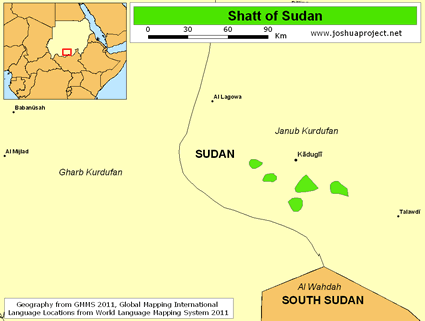The five Daju groups include the Shatt people. The Dajus make up some of the oldest communities in western Sudan and eastern Chad. Their history is one of independent rule and war with their neighbors. During the twelfth and thirteenth centuries, the Daju peoples migrated from the east and established rule over several tribes in the Dar Fur region of Sudan. In the sixteenth century, this dynasty was overthrown by the Tunjor. Fortunately for the Daju, however, their King escaped and set up a small kingdom in the Dar Sila region of Chad.
The Daju in Chad call themselves "Daju Sila," and those in Sudan call themselves "Fininga." Some of the other groups are named after the regions they occupy or after the distinct dialects of Daju they speak. That includes the Shatt people.
Most of the Shatt are farmers, and they primarily based their economy on grain production. Staple crops include millet, sorghum, and corn. They gather foods such as cereals, grasses, berries, honey, and wild fruits from the forests. They also hunt wild game.
The homes of the Shatt villages are usually round and have cone-shaped roofs. Town homes are rectangular in shape, with mud-brick walls and flat roofs. Young boys and girls of the villages become members of social groups and work groups. They perform community chores, such as keeping the villages clean and organizing village dances.
The Shatt are a patriarchal society in which the families are dominated by the older men. All parents desire to have a male heir, so sons are pampered while they are young children. When a boy reaches adolescence, his "representative" will approach the parents of a girl and propose marriage. Young men are given many responsibilities, such as preparing the fields for cultivation, planting the crops, buying the livestock, and trading in the market.
Shatt women are subordinate to the men. A woman's responsibilities include sowing the millet and sorghum, grinding the grain, preparing the meals, buying dry meat in the marketplace, selling chickens and eggs, and bearing as many children as possible. They expect wives to please their husbands and to raise the children without the help of their husbands.
Shatt women have many unique beauty customs. They whiten their teeth with sticks; tattoo their eyelids, gums, and lips with acacia thorns; and often remain bare-breasted among relatives.
At one time, a sultan (Muslim ruler) had total authority over all the Daju tribes. Today, however, sultans only possess nominal authority, such as presiding over religious ceremonies. The sultanate is passed down from father to son, and they grant the family of a sultan special rights and privileges. Daju tribes like the Shatt are subdivided into clans (extended family groups), and each clan has a leader called letuge. The letuge assists the sultan, as well as helping to give direction during times of war.
The Daju take great pride in their past war victories. They have a reputation among their neighbors and former French and British colonial administrators as being an explosive, warlike people. This is partially because of their mountainous homeland, which has made them difficult to control.
The Shatt of Sudan are mainly Sunni Muslims. Shatt children attend village classes where they are taught to chant the Koran in Classical Arabic. Unlike most Daju peoples, the Shatts have a small number of Christian believers.
All five Daju peoples have been Muslim since the fifteenth century. They revere the Koran and make all oaths and commitments according to its writings. They believe that if a person swears, he must do so by Allah, or otherwise, he/she must remain silent.
Although the Daju are almost entirely Muslim and follow Islamic teachings, they do not do so in the strictest sense. For example, not everyone attends Friday prayer at the mosque, and most people ignore the Islamic ban on drinking alcohol. Most of them keep their traditional animistic beliefs and mix them with their form of Islam. Most of them believe in good and bad spirits, form cults, and even practice witchcraft.
There is a great need for outreach and intercession to see to it that there is a complete harvest among the Shatt people.
Pray for Shatt believers to have hearts that are ready and willing to take the name of Jesus to Muslims throughout their region.
Pray for the Shatt people to have hearts that are open to the abundant blessings of Jesus Christ.
Pray for their families to prosper financially and spiritually as they experience a relationship with Jesus Christ.
Pray for a movement to Christ among the Shatt that will spread joy, peace, and salvation to other peoples in East Africa.
Scripture Prayers for the Shatt in Sudan.
| Profile Source: Joshua Project |











